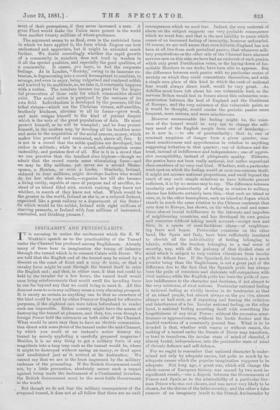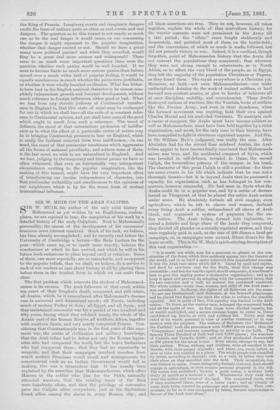INSULARITY AND PE:%.7INSULARITY.
TT is amusing to notice the excitement which Sir E. W.
Watkin's speech as to the practicability of the Tunnel under the Channel has produced among Englishmen. Already many of them hear in imagination the tramp of infantry through the tunnel which is to connect Calais with Dover. We are told that the English end of the tunnel may be seized by a descent on the coast of Kent and a conp de main, or that a cavalry force might be sent through the tunnel itself to seize the English end ; and that, in either case, if that end could be held by the invader for a few hours, the tunnel itself would soon bring reinforcements that would swell the invading force to one far beyond any that we could bring to meet it. All this does not seem to us in any military sense a very alarming prospect. It is surely as certain as anything can be that no structure of the kind could be used by either France or England for offensive purposes, if the slightest care were taken. beforehand to render such use impossible. Either country might have the means of destroying the tunnel at pleasure, and that, too, even though a foreign Power held the entrances on both sides of the Channel.
• What would be more easy than to have an electric communica- tion direct with some point of the tunnel under the mid-Channel, by which you could at an instant's notice destroy the tunnel by merely exploding a carefully prepared magazine P Besides, it is no easy thing to get a military force of any • magnitude into a long trap such as the tunnel would be, where it might be destroyed without seeing an enemy, or fired. upon and annihilated just as it arrived at its destination. We cannot say that we are in the least impressed by the military rashness of the proceeding. If the British Government could not, by a little precaution, absolutely secure such a tunnel against being made the instrument of a Continental invasion, the British Government must be the most futile Government in the World.
, Put though we do not fear the military consequences of the proposed tunnel, it does not at all follow that there are no such consequences which we need fear. , Indeed, the very outbreak of alarm on the subject suggests one very probable consequence which we must fear, and that is the new liability to panic which comes of an increased feeling of insecurity, however unfounded. Of course, we are well aware that even hitherto England has not been at all free from such periodical panics, that whenever mili- tary prepa:rations on the other side of the Channel have alarmed nervous men on this side; we have had. an outbreak of such panics, which only great Fortification votes, or the laying-down of for- midable Monitors in our docks, have been able to appease. But the difference between such panics with no particular centre of anxiety on which they could concentrate themselves, and with a single sore place of this kind to which the rush• of national fear would always direct itself, would be very great. As Achilles must have felt about his one vulnerable heel, so the nervous Briton would feel in future about this submarine com- munication between the heel of England. and the Continent of Europe ; and the very existence of this vulnerable point, as it would be thought, would render the periodic panics more frequent, more serious, and more mischievous.
However unreasonable the feeling might be, the exist- ence of the tunnel would be very apt to change the mili- tary mood. of the English people from one of insularity,— as it now is, — to one of peninsularity ; that is, one of constant suspicion of danger from a given quarter, con- stant sensitiveness and apprehension in relation to anything suggesting irritation in that quarter; one of defiance and dis- trust, instead, of indifference and independence ; one of aggren- sive susceptibility, instead of phlegmatic apathy. Hitherto; the panics have not been really national, but rather superficial class-emotions of no very real kind. Whether, with a particular weak spot on which the feeling would at once concentrate itself, it might not assume national proportions, and swell beyond the reach of any such simple sedatives as have hitherto proved sufficient, it is by no means easy to say. The difference between insularity and. peninsularity of feeling in relation to military alarms has hitherto certainly been this,—that such an island as ours, or, in the other hemisphere, such an island as Japan which stands in much the same relation to the Chinese continent that ours does to Europe, has shown, on the whole, a real and some- times almost brutal indifference to the interests and impulses of neighbouring countries, and has developed its own genius and resources without taking much account—except now and then, in a spasm of semi-factitious alarm—of neighbour- ing fears and hopes. Peninsular countries on the other hand, like Spain and Italy, have been sufficiently insulated to cherish all the individuality of feeling belonging to islands, without the freedom belonging to a real sense of security, nay, with all the jealousy of that divided state of mind which is subject to very sudden vibrations from insular pride to defiant fear. If the Spaniard, for instance, is a much prouder being than the L'uglishman, is not a great part of the difference due to the fact that the Spanish pride has always been the pride of conscious and elaborate self-comparison with rival nations, white the English pride has been the pride of care- less indifference to the character and destinies, if not almost to
the very existence, of rival nations. Peninsular national feeling is national feeling as vividly insular in its tendencies as that of an island people, but almost always on the gni dye, almost always at half-cock, as if expecting and, fearing the criticism and interference of a foe. Insular national feeling, on the otluar hand, is national feeling asserting itself with something like forgetfulness of any rival Power ; without the excessive sensi- tiveness or aggressiveness, without the hectic flushes and. the morbid reactions of a constantly present fear. What is to be dreaded is that, whether with reason or without reason, the making of a tunnel under the Straits of Dover may transform, or tend to transform, the insular state of mind of •cheerful, if almost brutal, independence, into the peninsular state of mind of chronic defiance and self-defence.
For we ought to remember that national character is under- mined not only by adequate causes, but quite as much by in- adequate causes which the popular imagination supposes to be adequate. Not long ago, a great war, which will change the whole course of European history, was caused by two most in- significant events,—one a dispute between the Governments of France and Spain as to the admissibility of a particular Ger- man. Prince who was not chosen, and was never very likely to be chosen, for the throne of the latter country; and the other a false rumour of an imaginary insult to the French Ambassador by
the King of Prussia. Imaginary events and. imaginary dangers excite the fears of nations quite as often as real events and real dangers. The question as to this tunnel is not nearly so much one as to the real danger it would cause, as one concerning the danger it might represent to the popular imagination, whether that danger existed or not. Should we have a great many more political panics ? and when they occurred, would they be a great deal more serious and widespread P These seem to us much more important questions than even the question whether such panics would be well founded. If we were to become liable to much more serious panics than before, spread over a much wider, field of popular feeling, it would be equally mischievous in result whether the panic were justifiable, or whether it were wholly founded on illusion. What has hither- to been best in the English national character is its almost com- pletely independent growth and buoyant development, without much reference to foreign influences, either good or bad. What we fear from any chronic jealousy of Continental interfer- ence in England is, that this state of mind. may be exchanged for one in which we shall have all the evils of a constant. refer- ence to Continental opinion, and yet shall have none of the good which ought to result from such a reference. The mood of defiance, the mood of that ostentatious profession of indiffer- ence as to what the effect of a particular course of action may be in bringing Continental pressure to bear on England, which is really the farthest removed from true indifference,—in one word, the mood of that peninsular touchiness which aggravates all the forms of national peculiarity, and softens none of them, is the last mood we wish to see naturaliseffin England. And we fear, judging by the temporary and trivial panics we have so often witnessed, that even an intrinsically very unimportant eircumstance exciting to the popular imagination, like the making of this tunnel, might have the very important effect of transforming our insular independence of character, into that peninsular irritability and sensitiveness to the opinions of our neighbours which is by far the worst form ef mutual international influence.




















 Previous page
Previous page